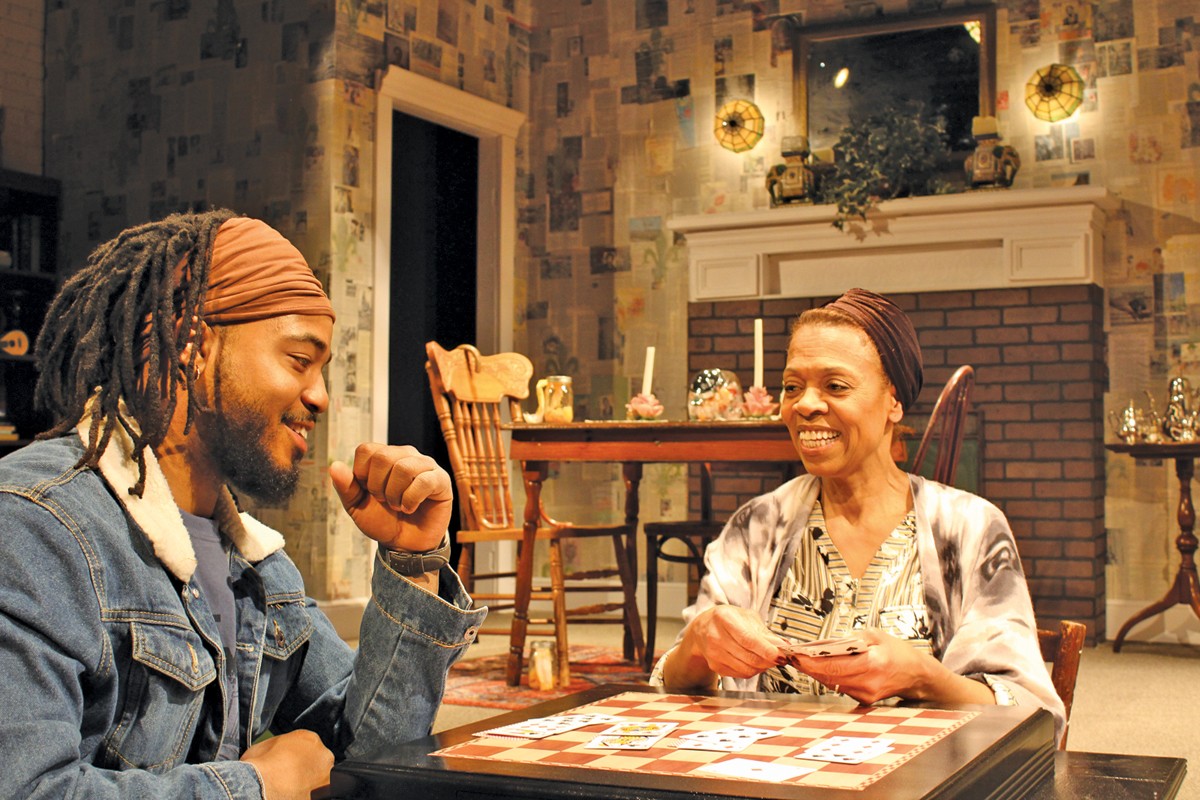Those in the know may remember the Tony-nominated debut of The Velocity of Autumn, written by Cleveland's own Eric Coble, on Broadway a few short years ago. After being produced in venues across the country, Coble's universal story of love and lust for life has come back home, where Director Nathan A. Lilly and the company at Karamu have given Autumn a new lease on life and a newfound identity.
At America's longest-standing African-American theater, the mother-son duo of Alexandra (Jeanne Madison) and Chris (Imani Khiry) are appropriately played by African-American actors. The fact that little, if anything, is lost in translation is a testament to the genuine nature of the script, its dialogue and the worldly conflict that lives within every parent and child.
Though most likely not to the extent that Alexandra has gone to. Within every crack and crevasse of her brownstone apartment, and adorning every shelf and surface, lie Mason jars filled with flammable fluids and cleaning rags poking out for enough Molotov cocktails to make the Unabomber blush. Slowly going senile and fighting with her older children on being placed in a retirement home — or worse, a psych ward — Alexandra has taken her last stand by barricading herself in her home. Armed with her father's trusty lighter, she promises to raise hell if the cops threaten to take her out by force.
Enter her youngest child, Chris, who, after placing himself in exile from the family for years, decides that it will be his burden to reach out to her by climbing through the window and thrusting himself into an intervention. Their initial argument gradually transforms into a greater understanding of each other, their wants and desires, and what they feel are the more meaningful parts of life.
Director Lilly has taken this incredibly visceral story and given it depth, even with the more subtle of approaches, such as the ever-changing distance between Alexandra and Chris as they agree and disagree repeatedly, each finding a reason to keep talking despite the desire to leave numerous times. The beats of the script are metered out such that there is never a dull moment. A mother and son reconnect, fall apart and somehow meet in the middle.
Speaking of the mother-son dynamic, Madison and Khiry's chemistry is simply impeccable. Madison carries herself effortlessly as a much older woman, yet with a grace that speaks to her extensive experience on the stage. And in making his Karamu debut, Khiry is sure to be a new favorite with his laid-back, charming demeanor and genuine delivery. The two share a Thanksgiving dinner's worth of clapbacks as well as plenty of soul-bearing confessions to make for an equally humoring and harrowing performance.
Originally portrayed by an older man, Khiry's portrayal of Chris as a physically younger man has further hammered home the ubiquitous nature of feeling free and the desire to be independent regardless of age or creed.
Much like the ever-present threat of the extremely combustible jars, it's time to address what issues some people may have with this play. Though initial reviews of its Broadway run suggest that the suspension of disbelief starts and ends with the notion that makeshift bottle bombs could actually blow up a whole city block, this criticism is — to a degree — a moot point, as the conflict rests much more in Alexandra teetering on the edge of violence in the first place, and the guilt Chris feels for leaving but at the same time understanding that his need to be alone stems from his mother, where they first reach common ground.
Focusing too much on these elements detracts from the experience, as the play works a whole lot better if you enter it with an open mind and recognize what it is: a story about being able to let go. Whether that's life and the fleeting nature of it, a job, a home, or a way of living. And that's where this play truly hits you, and it does a splendid job of feeling authentic.
Further encompassing the intimacy of the play is the tremendous attention to detail in the set by Inda Blatch-Geib and Dred Geib, who've dressed the stage with enough knickknacks to really emphasize that the audience is seeing a woman who has lived quite a fulfilling life. Additionally, Richard Ingraham's work on the sound design adds a final touch to the portrait, as the sounds of the city below Alexandra's New York apartment fill the space just enough to make you feel immersed.
If The Velocity of Autumn teaches its audience anything within its runtime, it's that there is nothing quite like the beauty within the finality of life, and that life is worth living by enjoying the arts and other activities that fulfill that thirst for expression and freedom. Those looking for something like this will be very fulfilled with a production that sticks with you long after the curtain falls.


